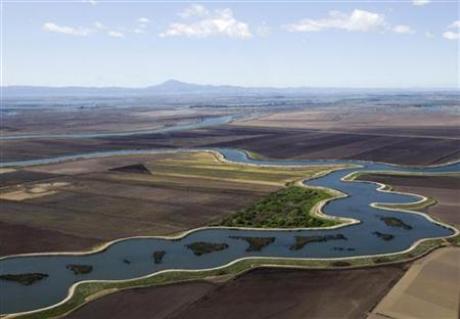California to get more water

California's drought-baked cities and farms will get considerably more water this year than last from federal officials, Interior Secretary Ken Salazar said on Tuesday, making good on forecasts issued in February after a series of strong winter storms.
Irrigation districts south of the Sacramento-San Joaquin River Delta, which represent farmers on the west side of the state's Central Valley, will get 25 percent of their contracted water allotment from the U.S. Bureau of Reclamation, Salazar said, up from just 5 percent in February.
The increase was issued ahead of schedule and comes at a critical time for the Central Valley, which is one of the country's most bountiful agricultural regions. California, the No. 1 farm state, produces more than half the fruits, vegetables and nuts grown in the United States.
But Salazar said California, which has suffered through three years of drought that has prompted rationing, higher charges and mandatory conservation measures, must work out long-term solutions to its ongoing water crisis.
"We essentially are dealing with a system that is strained and in collapse and has no certainty with respect to water supply for both for agricultural and municipal use on the one hand and for environmental demands," Salazar said.
"Hopefully we will be able to work with the state of California, with all of the water users and members of California's (Congressional) delegation to fashion a long-term plan that's so badly needed," he said.
'GREAT CHALLENGES'
Salazar said the Bureau of Reclamation will, as forecast, supply most California users with 100 percent of the water they are contracted to receive. Irrigation districts north of the Sacramento-San Joaquin River Delta will get 50 percent of their contracted allotments, also up from 5 percent in February.
The state Department of Water Resources boosted its allocation for all users to 15 percent, up from 5 percent last year, but director Mark Cowin said hydrology conditions prevented the agency from increasing it even more despite the wet winter.
"It is clear that both the state and federal water projects face great challenges in delivering the amount of water that our farms, businesses and residents need this year," he said.
The state and federal water deliveries could change during the year, depending on weather, snowpack and runoff.
Dramatic cutbacks in water deliveries by the Bureau of Reclamation and Water Resources Department during the drought had idled thousands of farm workers and big areas of cropland.
Relief came when winter storms left several feet of snow on the Sierra Nevada mountain range that serves as the state's main source of surface water, although officials have stopped short of declaring the drought over.
The dire straits facing Central Valley farms had prompted U.S. Senator Dianne Feinstein to draft controversial legislation that would have eased environmental restrictions to allow more water to be pumped out of the Delta for growers -- a plan she abandoned in February after the improved forecasts.
Feinstein called Tuesday's allotment "good news" for farmers seeking bank loans.
"I'm pleased that the Interior Department has recognized the urgency of the water crisis and worked quickly to provide this updated allocation announcement ahead of schedule," Feinstein said.
The state supplies more than 25 million people and over 750,000 acres of farmland with water from the Delta.
(Editing by Eric Walsh)
© Thomson Reuters 2010 All rights reserved
